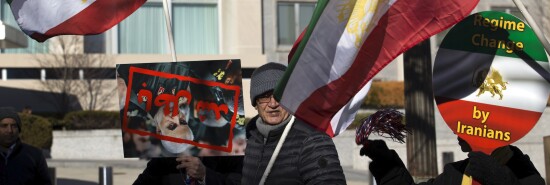
Mujahedin-e-Khalq isn’t a cult? Prove it
Michael Rubin
Ali Safavi, a foreign affairs spokesman for the Mujahedin-e-Khalq Organization (MKO), is upset that I called the Mujahedin-e-Khalq Organization (MKO) a “cult.” His response is deflection, full of hot air and personal attacks. But he avoids the factual points of my article. So, why not a quick test? If the MKO is not a cult, can Safavi prove it by documenting any disagreement with Maryam Rajavi, the organization’s leader?
Let’s start with a few issues that should be easy:
Does Safavi disagree, for example, with Rajavi over the group’s alliance with Ayatollah Ruhollah Khomeini in the lead up to the Islamic Revolution? Or maybe Safavi can show where he or any other members of the group disagreed with the MKO’s documented acts of terrorism against Americans and American companies in Iran at that time? After Khomeini consolidated control and purged the Mujahedin from the ranks of his followers, the MKO’s rank-and-file regrouped in Iraq where it became a proxy for Saddam Hussein. Does Safavi regret that decision? Maybe Safavi can explain why the entire episode of the MKO’s decades-long alliance with Saddam Hussein is omitted from the history the MKO relates on its website? Can Safavi point to a single tactical disagreement or argument that he or any other senior leaders have had with Maryam Rajavi? She has been “president-elect” for 30 years. Is it normal for “democratic” movements to have complete, even totalitarian agreement on every single issue over the course of a week or month, let alone three decades? Can Safavi point to any other “democratic” movement where thousands of followers never disagree with each other or their leader? Can Safavi explain why, if the network of organizations that Rajavi controls are independent, he gets so upset when anyone suggests an audit? A religious-political group If the MKO isn’t a cult, why is it that its members remain isolated from the world around them? Iranians support all sorts of political movements. Many want a liberal democracy, even if they debate about whether that should be a parliamentary democracy or a presidential republic. A few may want the return of Reza Pahlavi, the late shah’s son, though they debate what power if any the monarchy should have. There are some other extremes. The National Iranian American Council, for example, still appears to believe the Islamic Republic is legitimate. All have lives outside their small political group. They do not live in group homes, dress alike, wear their facial hair alike, and refuse to live with or mix with others.
Safavi can splutter and can claim the MKO is not a cult but, sometimes, if it looks like a duck and quacks like a duck, it’s more than daffy. That said, Ali Safavi, prove me wrong: You have tweeted more than 35,000 tweets. Can you find a single one that puts you at dissonance with Rajavi on any issue?
On one thing we agree. Iranians want freedom from the Islamic Republic. They want the revolutionary regime to fall. Where we disagree is that Iranians do not want to replace an authoritarian regime with a totalitarian one. They want democracy, not a cult.
CLICK HERE TO READ MORE FROM THE WASHINGTON EXAMINER
Michael Rubin (@mrubin1971) is a contributor to the Washington Examiner’s Beltway Confidential. He is a senior fellow at the American Enterprise Institute.
